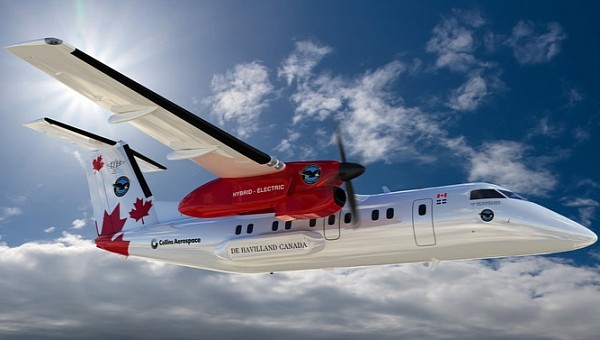ICE-electric hybrid automobiles are nothing new. If anything, they're downright routine. But hybrid aircraft, on the other hand, now that's a much trickier animal to tame. But if there were ever a group capable of bringing turbine-electric hybrid jet engines to the masses, considering how far they've come, it'd be Collins Aerospace and Raytheon.
With assistance from Pratt & Whitney Canada's Longueuil, Quebec innovation facility, Raytheon and its subordinate company Collins Aerospace have just completed stand-alone testing of a novel turboprop engine assisted by a one-megawatt electric motor. Said electric motor is Collins Aerospace's primary contribution to the project. In theory, the electric motor should allow any turboprop engine it's attached to operate with greater efficiency and fewer fuel expenditures.
With an expressed goal to reach as close to net zero carbon dioxide emissions as possible by the time this decade is out, the novel e-motor will be mounted inside a perfectly normal De Havilland Canada DHC-8 regional airliner. All in the hopes of bringing the first practical hybrid-electric turboprop motor specifically intended for medium-sized regional airliners.
Riding a $163 million wave of investments started in July of last year, it shouldn't be too long before Collins, Raytheon, and DeHaviland Canada have a working prototype ready to fly. The target threshold the aerospace company trio wishes to achieve is a factor of 30 percent more fuel efficiency during typical passenger-carrying operations compared to a DHC-8 with two typical Pratt & Whitney Canada turboprop engines.
But efficiency is not the only point of concern when it comes to this novel jet-electric hybrid engine. As should be obvious, building airplanes that use elements of EV technology in their power trains are much tricker to make work properly than a hybrid on four wheels. Power-to-weight ratios are just as, if not more, important in the air than they are at the race track, so this new electric motor-assisted jet mustn't lose any performance over its typical cousins.
"We are honored that Raytheon Technologies has chosen our Design Approval Organization to lead the flight test program for this historic demonstrator project," said John Maris, 3C president and chief test pilot for the project.
"3C has assembled a trusted Quebec team that includes Chrono Aviation, WAAS Aerospace, and Elisen & associés to integrate the hybrid-electric powertrain, battery system, and high voltage electrical harness into 3C's Dash 8 research aircraft. I am confident that 3C's extensive flight test experience and historical relationship with Transport Canada will complement Raytheon Technologies' outstanding team to safely demonstrate this important technological advance."
As of the present day, Raytheon and its partner contractors expect the first working prototype to be ready to fly by at least the beginning of 2024, with full-scale commercial production hoped to start soon afterward, assuming all goes to plan.
With an expressed goal to reach as close to net zero carbon dioxide emissions as possible by the time this decade is out, the novel e-motor will be mounted inside a perfectly normal De Havilland Canada DHC-8 regional airliner. All in the hopes of bringing the first practical hybrid-electric turboprop motor specifically intended for medium-sized regional airliners.
Riding a $163 million wave of investments started in July of last year, it shouldn't be too long before Collins, Raytheon, and DeHaviland Canada have a working prototype ready to fly. The target threshold the aerospace company trio wishes to achieve is a factor of 30 percent more fuel efficiency during typical passenger-carrying operations compared to a DHC-8 with two typical Pratt & Whitney Canada turboprop engines.
But efficiency is not the only point of concern when it comes to this novel jet-electric hybrid engine. As should be obvious, building airplanes that use elements of EV technology in their power trains are much tricker to make work properly than a hybrid on four wheels. Power-to-weight ratios are just as, if not more, important in the air than they are at the race track, so this new electric motor-assisted jet mustn't lose any performance over its typical cousins.
"We are honored that Raytheon Technologies has chosen our Design Approval Organization to lead the flight test program for this historic demonstrator project," said John Maris, 3C president and chief test pilot for the project.
"3C has assembled a trusted Quebec team that includes Chrono Aviation, WAAS Aerospace, and Elisen & associés to integrate the hybrid-electric powertrain, battery system, and high voltage electrical harness into 3C's Dash 8 research aircraft. I am confident that 3C's extensive flight test experience and historical relationship with Transport Canada will complement Raytheon Technologies' outstanding team to safely demonstrate this important technological advance."
As of the present day, Raytheon and its partner contractors expect the first working prototype to be ready to fly by at least the beginning of 2024, with full-scale commercial production hoped to start soon afterward, assuming all goes to plan.





